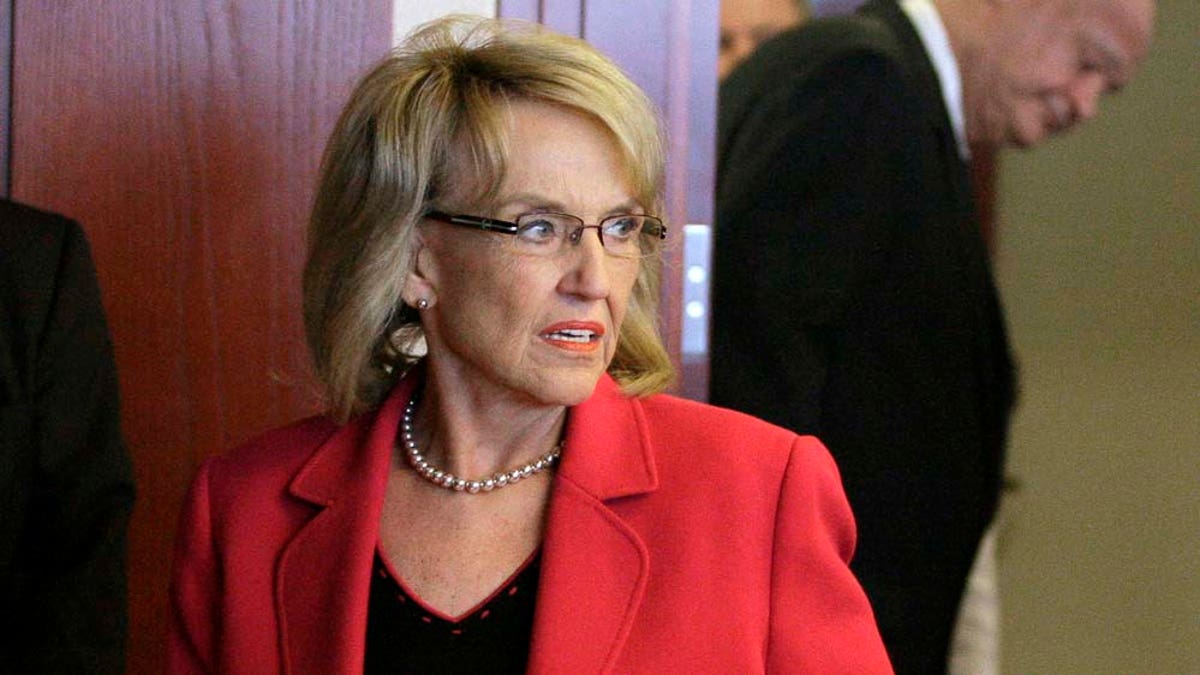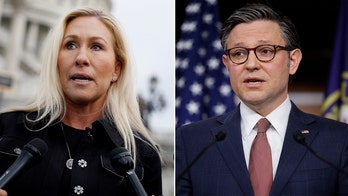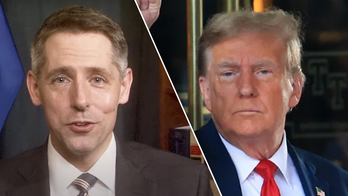
Arizona Gov. Jan Brewer, left, and Arizona Attorney General Tom Horne, back, arrive for a news conference where they announced the state's decision to appeal to the United States Supreme Court by July 11, a decision by a lower court that put the most controversial parts of the state's immigration enforcement law on hold, Monday, May 9, 2011, in Phoenix. (AP Photo/Ross D. Franklin) (AP)
Do Arizona immigration laws use racial profiling?
Many opponents claim so, but Gov. Jan Brewer's lawyers argue those claims are merely speculations, and have asked a federal judge to reject a bid to prevent police from enforcing the statute's most contentious section.
The Republican governor's attorneys told U.S. District Judge Susan Bolton in a filing Friday that the law's requirement that police check the immigration status of people they stop for violations other than immigration should be allowed to take effect.
Opponents have called this the "show me your papers provision" and say that it will inevitably lead to discrimination against Hispanics.
A coalition of civil rights, religious and business groups that oppose the law launched a fresh attack after the U.S. Supreme Court in late June upheld the section in question and rejected others.
The opponents asked Bolton to block enforcement of the provision before it takes effect, arguing that Latinos in Arizona would face systematic racial profiling and unreasonably long detentions if that section is enforced.
They also argued that special patrols, known as immigration sweeps, launched in recent years by Maricopa County Sheriff Joe Arpaio show that the law's requirement will disproportionately affect Latinos.
Arpaio's office has been accused by both a small group of Latinos and the U.S. Justice Department of racial profiling, a charge the sheriff has vigorously denied.
Written closing arguments are due Thursday in a racial profiling case filed by the group of Latinos against Arpaio's office. No trial date has yet been set in a separate civil rights case filed against the sheriff's office by the Justice Department.
Brewer's lawyers said the opponents haven't shown that enforcement of the questioning requirement will lead to racial profiling or prolonged detentions of Latinos. They also said the allegations against the sheriff's department are unrelated to the 2010 law.
The governor's attorneys also pointed out that the law explicitly prohibits discriminatory policing and that the state's police training and licensing board developed standards for enforcement that avoid profiling.
If the judge agrees with Brewer's lawyers it's unclear exactly when police could begin to enforce the requirement.
Legal experts say the opponents face an uphill battle in trying to persuade Bolton to bar enforcement of the requirement because the lower courts might want to wait until the requirement is enforced to consider actual injuries from the law, rather than confront the potential for harm.
Even if opponents don't succeed in getting the requirement put on hold, some backers of the law are questioning the level of cooperation they will get from federal immigration authorities, who will be called to verify people's immigration status and be responsible for picking up illegal immigrants from local officers.
Federal immigration officers have said they will help, but only if doing so conforms to their priorities, including catching repeat violators and identifying and removing those who threaten public safety and national security.
If federal agents decline to pick up illegal immigrants, local officers in some cases will likely have to let them go unless they're suspected of committing a crime that would require them to be brought to jail.
Based on reporting by the Associated Press.
Follow us on twitter.com/foxnewslatino
Like us at facebook.com/foxnewslatino




